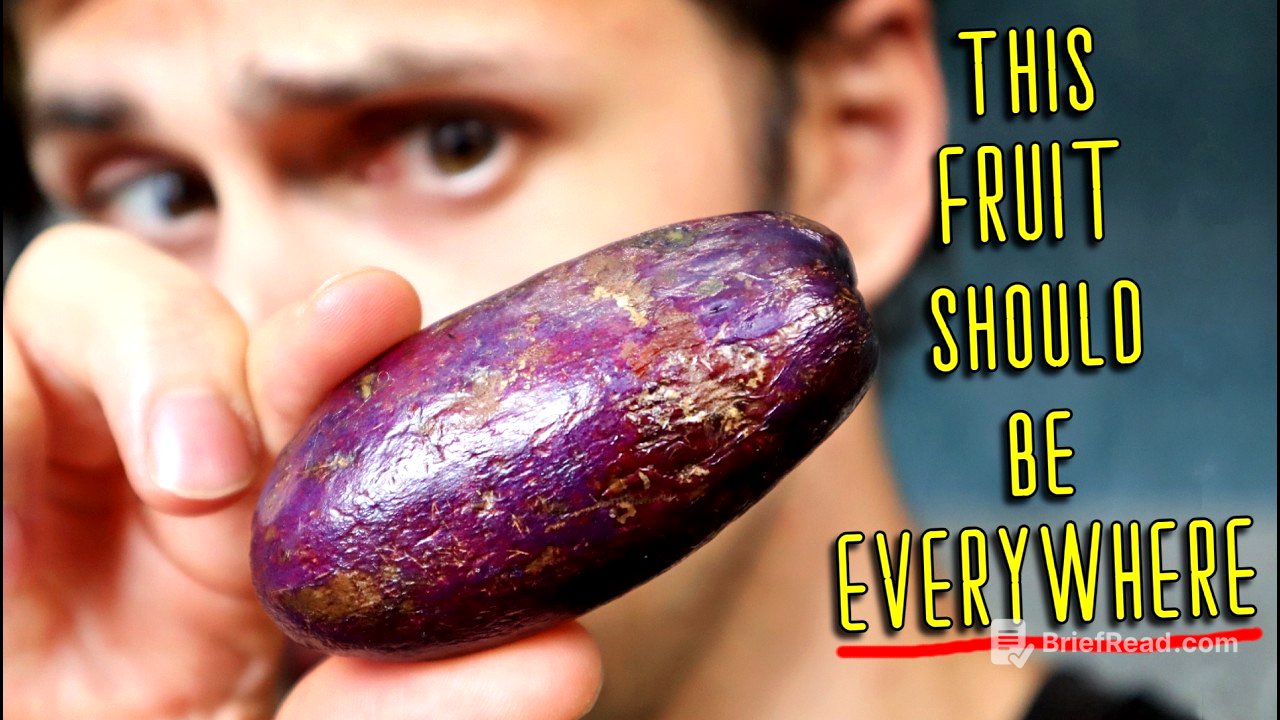TLDR;
This video is all about Safou, an underutilized fruit from West Africa with a unique flavor profile. The host explores different ways to prepare and enjoy Safou, including raw, cooked, and in experimental recipes like safocado toast and ice cream. The key takeaways are:
- Safou is a versatile fruit with a taste similar to avocado but with added notes of lime, black pepper, and cheese.
- It can be used in place of avocado in dishes like avocado toast, potentially offering a more flavorful experience.
- Safou is not widely available but can be found in West African markets or through specialty fruit vendors.
Introduction to Safou [2:07]
The host expresses his excitement about Safou, a fruit he considers underutilized despite its potential. He plans to explore the fruit in various ways, including raw, cooked, in traditional African recipes, and in experimental dishes like Safou ice cream. He emphasizes the fruit's special qualities and the many possibilities for its use.
What is Safou? [2:07]
Safou belongs to the berseraceier family, which includes trees that produce frankincense and myrrh. While related to fruits like Dubai, Chinese olive, and pillut, it is in a different genus. Originating from West Africa, Safou is typically cooked with hot water or roasted and served with salt by street vendors. The host first encountered Safou at a fruit festival in Queensland, Australia, where a fruit hunter gifted him the Parvy Karpa variety, known for being smaller and rounder. He also acquired the larger, longer Edgulus variety at an auction, allowing for a comparison of the two.
What does Safou taste like? [6:51]
The host and his friend Stephen try Safou raw, despite it typically being eaten cooked. They describe the raw fruit as tasting like a sour stick, advising against eating it this way. After soaking the Safou in hot water to soften it, they find the smaller variety softens quicker. They describe the taste as similar to avocado with lime, black pepper, olives, cheese, sour cream, and butter, resembling loaded nachos without the chips. The larger variety is more sour but can be neutralized with salt.
Safou Experiments [11:12]
The host reflects on his trip to Australia, where he found an abundance of rare fruits, including Safou. Due to the sheer volume of fruit, he couldn't dedicate as much time to Safou as he wanted. Since returning home, he obtained fresh Safou from partisfarmms.com and plans to try a traditional West African preparation by pan-frying it in red palm oil.
Fried safou fruit in red palm oil [13:07]
The host prepares Safou by pan-roasting it in red palm oil, a traditional West African method. He acknowledges the controversy around palm oil but clarifies that red palm oil is produced through a kinder process. The resulting flavor is a combination of roasted sweet potato and guacamole, which he finds enjoyable. Roasting the Safou adds an extra layer of flavor.
Safoucado toast! [15:00]
Inspired by Australia's avocado toast, the host creates "safocado toast" using Safou on an everything bagel in New York City style. He mashes the softened Safou with salt and spreads it on the bagel, noting the similarity in texture to avocado. The taste is described as avocado toast with lime, lemon, pepper, and a savory, cheesy note. The host highly recommends safocado toast, suggesting it should be a staple in Australian cafes. He also mentions that frozen Safou can be used as a substitute, though it's not as good as fresh.
Safou Ice Cream Review [19:01]
The host tries Safou ice cream, a vegan product made with soy milk and egg replacer, which he found at a West African market. The ice cream has a brown color and a slightly clumpy texture due to its vegan nature. The flavor is unexpected, resembling a piny mango rather than vanilla or avocado. The Safou adds a creamy element, but the host believes it would be better if it wasn't vegan, as the texture is somewhat off with ice crystals.
Conclusion [22:28]
The host concludes that Safou is a versatile and tasty fruit that should be more widely available. He believes it could directly compete with avocados in supermarkets, offering a unique and flavorful alternative. He expresses hope that the video has been interesting and thanks his Patreon supporters for their contributions.









